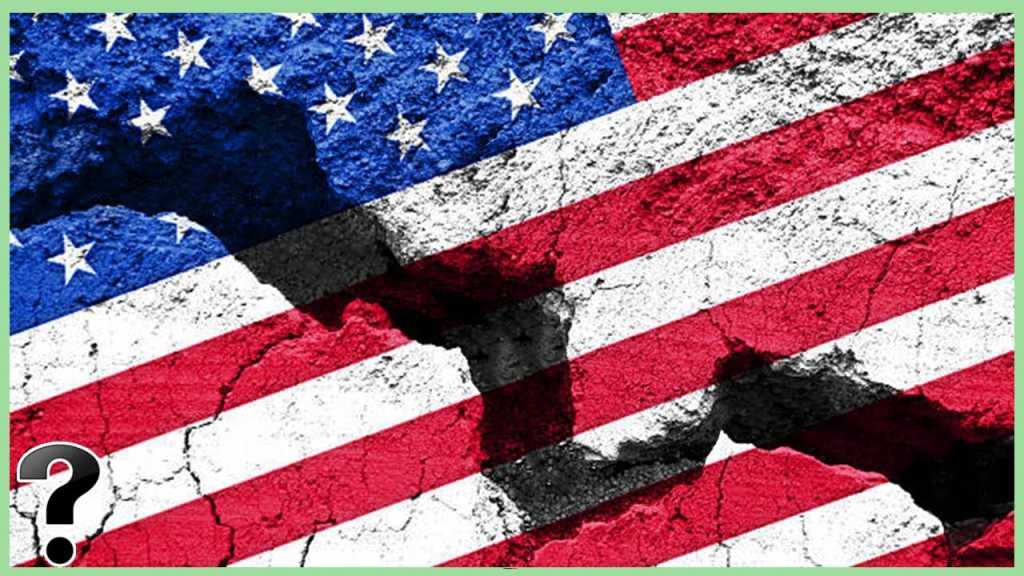
Can the United States Stay United?

By Darko Lazar
The United States has never been a champion of liberty. It’s not an indispensable nation or the land of the free. And it is by no means a perfect union. On the contrary, this continental nation, founded on genocide, stolen land, and imperial expansion, is deeply divided along political, cultural, and religious lines.
These characteristics have paved the way for endemic political conflict throughout the country’s nearly 250-year history. But its ‘unity’ was always preserved by what is presently one of the world’s most powerful and repressive organizations – the US federal government, which controls vast assets, more than one million armed men, and thousands of nuclear warheads.
It would be wrong to argue that our era offers obvious signs that current divisions in the United States are more severe than at any other time in the country’s history and are certain to lead to disintegration or civil war. But it’s equally implausible to ignore the increasingly poisonous political milieu and the fact that a growing number of Americans see a national divorce as the best solution to their ever-expanding list of grievances.
This includes everything from the soaring federal deficit, inflation, and declining wages to collapsing infrastructure, the rising tide of woke policies, and, of course, the intensifying migrant crisis.
The Lone Star State
Concerns about a potential American unraveling are amplified by the fact that 2024 is an election year in which immigration is emerging as a major worry for voters.
A recent AP-NORC poll shows that those voicing concerns about immigration climbed from 27% in 2023 to 35% this year. Among Republicans, that number is even higher, having risen to 55% from 45% in the previous year.
This year’s primaries in Iowa and New Hampshire revealed that for Republican voters, immigration was the number one issue followed by the economy and jobs.
Another survey conducted in January by Harvard CAPS-Harris found that immigration had overtaken inflation as the top concern among all respondents, rising from 28% to 35% in just one month.
It’s impossible to say exactly how many people are illegally crossing the US-Mexico border. But in December alone, US Border Patrol reported a record 302,034 “encounters”. During the 2023 fiscal year, which ended in September, border agents apprehended more than 2.4 million illegal migrants. Only a small fraction of those were deported, while the rest are allowed to seek asylum and remain in the country during the lengthy processing period.
In an America that is growing apart and increasingly looks like two separate ‘red’ and ‘blue’ entities, the weapon of mass migration is being exploited by both Democrats and Republicans.
Democrats are being accused of introducing open-border policies and trying to turn the influx of migrants into future voters to secure a permanent majority, while Republicans are bussing asylum seekers from the southwestern frontier to Democrat-run cities like New York, Washington, and Chicago, with the aim of causing widespread voter dissatisfaction.
In Texas, one of the frontline states, the situation has descended into a constitutional crisis, with Republican Governor Greg Abbott accusing the federal government of breaking the compact with the states by not only refusing to enforce immigration laws, but actually violating them.
In 2021, Abbott launched ‘Operation Lone Star’, seeking to assert state jurisdiction over border and immigration enforcement. Since then, he has declared the migrant crisis an “invasion” and invoked a state constitutional right to wage war when invaded.
In addition to signing a bill into law that declares illegal crossings a state crime and permits Texas law enforcement agencies to arrest undocumented immigrants anywhere in the state, Abbott has also been stepping up the role of the Texas National Guard along the 1,000+ kilometer border with Mexico.
Last month, Abbott was spurred on by 25 Republican governors, who released a joint statement applauding him for "stepping up to protect American citizens from historic levels of illegal immigrants".
Florida Governor Ron DeSantis went a step further and said he was deploying Florida National Guard and State Guard members to Texas to assist with placing razor wire along the southern border.
Both Abbott and DeSantis are effectively ignoring a January Supreme Court ruling that handed the Biden White House a victory by allowing federal officials — namely the Border Patrol — to remove razor wire installed by Texas. The federal government claims that the fencing endangers migrants and undermines the work of Border Patrol agents.
Amid the escalating standoff, the Democrats have started calling for the federalization of the Texas National Guard, which would give Biden full control over the military unit.
The absence of any kind of political consensus on the issue is allowing the media to speculate about Texas seceding from the United States and becoming a fully independent nation. Meanwhile, the so-called ‘Texit’ campaign and the leading pro-independence group, the Texas Nationalist Movement, are gradually moving from the fringes into mainstream politics.
The worsening border crisis has raised fears that any kind of divorce from the US would not be a peaceful one for Texas.
For now, at least, this is still a legal and political battle over a central election issue, mobilizing voters, and perhaps, most importantly, dictating how billions of taxpayer dollars are spent.
The biggest election year in history
Although more than 50 countries with a combined population of around 4.2 billion are set to hold elections in 2024, much of the world’s attention is focused on November’s presidential vote in the US.
Some of that attention is justified because the outcome of the presidential election will not just determine the course of internal disputes but will also have an effect on how the world’s biggest economic power behaves on the global stage and whether it chooses to deepen its confrontation with other nuclear powers.
Unlike in previous years, this election season is unfolding in the shadow of what many Americans still consider to be the unresolved 2020 vote.
According to a recent Gallup poll, only 28% of Americans are satisfied with the state of their democracy. That so-called democracy also happens to be the ideological foundation of American society.
The Gallup poll also shows that more than 36% of Americans believe Joe Biden’s victory in 2020 was fraudulent. That number goes up to 69% among Republicans. But these are hardly the only elements that make this race different from any other election in US history.
Biden’s challenger, Donald Trump, is facing more than 90 criminal charges and is fighting to keep his name on the ballot in some states. Meanwhile, the incumbent, whose approval ratings have completely collapsed, has been publicly characterized by a special counsel as a “well-meaning, elderly man with a poor memory” and “diminished faculties.”
For the rest of the world, this is no cause for celebration. Despite American imperialism, bloody foreign interventions, and Washington’s abuse of hegemony, the vast majority of global leaders are eager to see a peaceful election play out in the US.
The world is hoping that both the incumbent and the contender accept the outcome of the election regardless of who is declared the winner. Any alternative scenario could seriously destabilize and gradually fracture the country, which carries potentially catastrophic consequences for the global economy and – depending on who gets control over the vast resources of the federal government – for global security as well.



